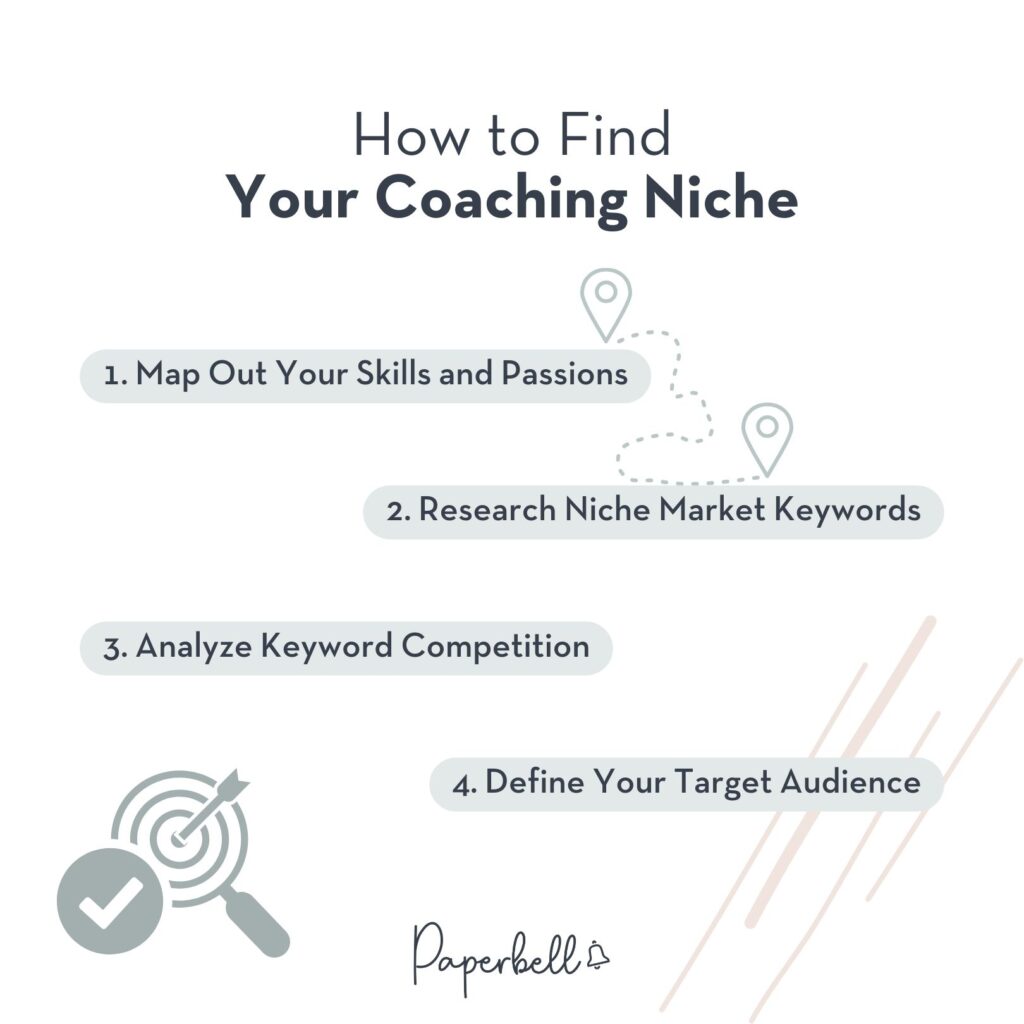The great thing about coaching is that you get to shape your business around what excites you. But to build a thriving practice, you also need to align your passion with what people are looking for.
Here’s how to find your niche so you can attract your dream clients and create a business you love.
What Is a Coaching Niche?
A coaching niche is simply a specialization. It defines who you help and how you help them.
“Coach” is a broad term that can mean many things. Some coaches focus on leadership, while others help clients with personal growth, relationships, or career transitions.
Choosing a personal niche allows you to stand out and attract the right clients. There are many types of coaching out there. Here are some broad niche ideas to start with:
- Leadership coaching
- Executive coaching
- Career coaching
- Sales coaching
- Personal development coaching
- Mindset coaching
- Financial/money coaching
- Business coaching
- Health and wellness coaching
- Relationship coaching
- Family and parenting coaching
- Spiritual coaching
Your niche can also be defined by your audience. Most coaches specialize in working with specific demographics, like new entrepreneurs or women at a particular stage of their lives.
The more specific your niche, the easier it is to attract the right clients. Instead of just “career coaching,” you might focus on helping mid-career professionals transition into leadership roles or guiding freelancers to build sustainable online businesses.
Why Does Niching Down Matter?
Imagine you’re looking for a business coach to help launch your practice. You come across someone who also offers fitness, relationship, mindset, and parenting coaching.
Would you trust them as an expert in business? Probably not.
The broader your niche, the harder it is to stand out. Clients want a specialist, not a generalist. By narrowing your focus, you’ll attract the right people who truly need what you offer while filtering out those who aren’t the best fit.
You can’t coach everyone, and you don’t have to. The more specific your niche, the deeper your impact.
Once you find that sweet spot, coaching becomes more fulfilling, your expertise and skill set grow, and attracting paying clients gets much easier.
How to Find Your Coaching Niche
Investing time in refining your niche can pay off big time. Here’s how market research can inform your choice.

1. Map Out Your Skills and Passions
Before you can coach others, you need to understand what drives you. Your niche should align with both your strengths and what excites you.
Start by asking yourself:
- What topics light you up?
- In what areas do you have (or want to earn) expertise?
- What do people often ask you for advice on?
Write everything down—even if it doesn’t seem like a niche yet. If you’re unsure of your strengths, ask friends, family, or even a coach for their perspective. Sometimes, others see our talents more clearly than we do.
Once you have a list of skills and passions, the next step is to match them with a coaching niche that’s in demand.
2. Research Niche Market Keywords
Keywords play a crucial role in marketing your coaching business to the right people. By researching niche-specific terms, you can gauge demand and identify the most profitable coaching niche of your interest.
You can use a free tool like Google Keyword Planner or Backlinko for this.

Start by looking up terms related to coaching areas you’re potentially interested in. The search intent, or reason behind a search, will give you a better idea of what potential clients in that niche need.
For example, someone searching for “how to budget” is likely looking for guidance on financial management. If you read the top-ranking articles for the keyword, you’ll get a more detailed perspective on what this person is likely looking for.
The search volume of keywords (the number of people looking the term up in a month) will give you a better idea of the market potential of the coaching specialty they are related to.
Enter terms related to your expertise and interest, and note keywords with a high search volume of at least 1,000 monthly global searches. Anything lower might indicate a market too small to sustain a business.
Try to get specific. For example, “health coach” is too broad to suggest client needs. Instead, you might check “HIIT exercise” or “plant-based meal plan.”
Narrowing down your focus lets you create tailored coaching packages and attract the right audience for them.
3. Analyze Keyword Competition
Checking how competitive your keywords are will help you choose a profitable niche where you can stand out more easily. You can do this by comparing big estimates or how much advertisers pay per click for a keyword.
Higher bids usually mean a more competitive market. For example, content marketing keywords might cost $5–$30 per click, while fitness coaching terms range from $3–$10.
Specific search terms tend to cost less, suggesting that the more specialized your niche is, the lower your competition will be.
You can refine your keyword research further by doing the following:
- Prioritize keywords with high search volume and low competition.
- Eliminate overly competitive keywords unless you’re deeply passionate about them.
- Trust your gut! If the idea of a niche business excites you, don’t dismiss it just because it’s competitive; find a way to offer something unique with it.
Your goal is to find a balance between demand, competition, and personal interest.
4. Define Your Target Audience
You’ve done your research; now, it’s time to define who you want to serve.
Narrow your focus within your coaching niche. For example, working in the business niche, you could help startup founders launch their businesses, artists reach a steady cash flow, or stay-at-home moms turn their hobbies into e-commerce businesses.
Instead of trying to serve everyone, consider the following:
- What specific problem do you want to solve for your clients?
- Where are your clients currently in this process?
- What experience or expertise can you leverage to create a solution for them?
Defining your ideal client helps you create more relevant offers and messaging for them, but you also need to consider what’s already out there. Look at other coaches in your niche and their target audiences.
To bring it all together, create detailed personas that clarify your client’s:
- Age, profession, and background
- Biggest pain points and goals
- Where they seek advice (social media, books, podcasts, etc.)
By defining your audience clearly, you’ll attract the right clients and avoid working with those who aren’t a good fit.
FAQ
How Do I Know If I’m Ready to Choose a Niche?
If you have a clear understanding of your skills, passions, and ideal clients, you’re ready to choose a niche. It helps to test ideas through research and talking to potential clients.
Can I Change My Coaching Niche Later?
Sure, you can evolve your niche as your coaching business grows. Many successful coaches refine or shift their niche based on experience and market demand.
What Is the Best Niche for Coaching?
The right niche for your coaching is the one that aligns with your strengths, expertise, and market demand. It should also solve a clear problem for your target customers to make your services highly relevant.
What Type of Coach Is Most in Demand?
Life coaching, business coaching, career coaching, and health and wellness coaching are consistently in high demand. However, focusing on specific sub-niches (e.g., career transition or mindfulness coaching) can help you stand out.
How Do I Test a Niche Before Committing?
Start by researching keyword demand, speaking with potential clients, or offering free consultations to gauge interest. This helps you validate whether your niche has a solid market before fully committing.
Build a Thriving Coaching Practice
Now you know who you’re serving. Ready to set up your coaching packages for them?
With Paperbell, you can create custom packages with various pricing plans, from installments to subscriptions, and get landing pages set up for them automatically.
Paperbell also handles your bookings, contracts, surveys, coaching materials, and a lot more. Try it now for free and see how it can help you build a streamlined, successful business.

Editor’s Note: This post was originally published in February 2023 and has since been updated for accuracy.









